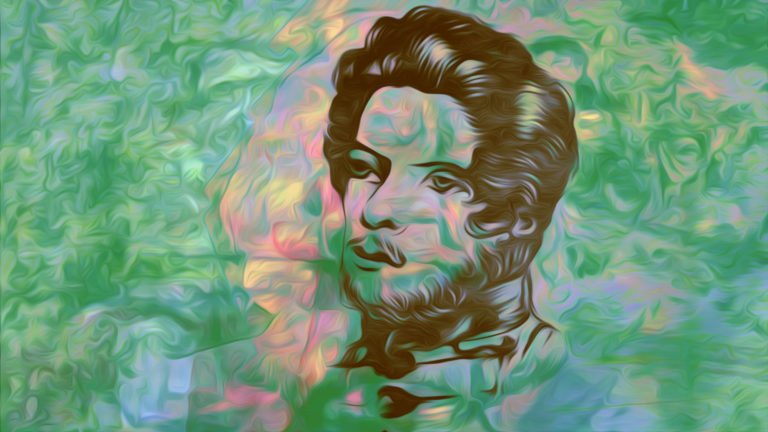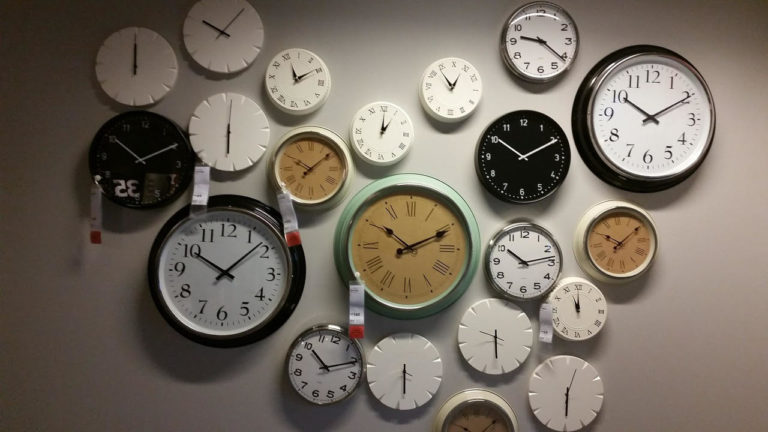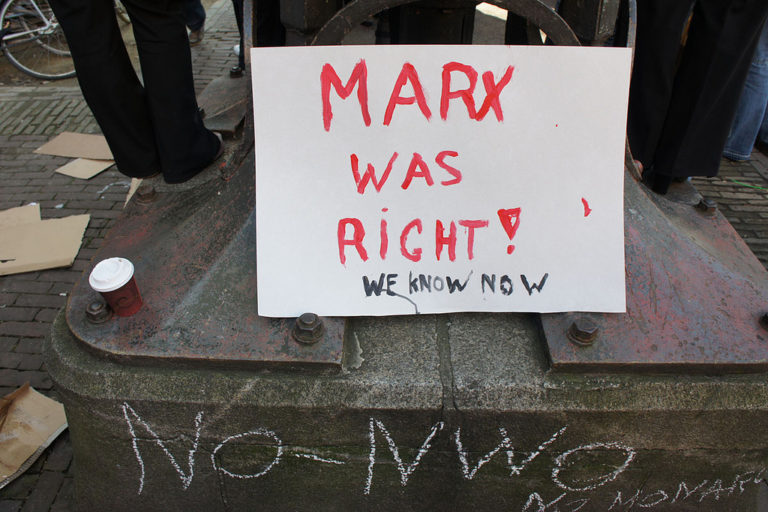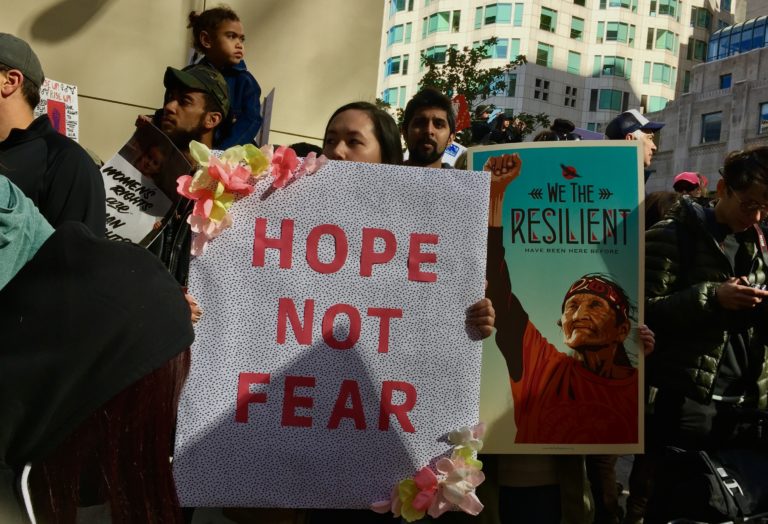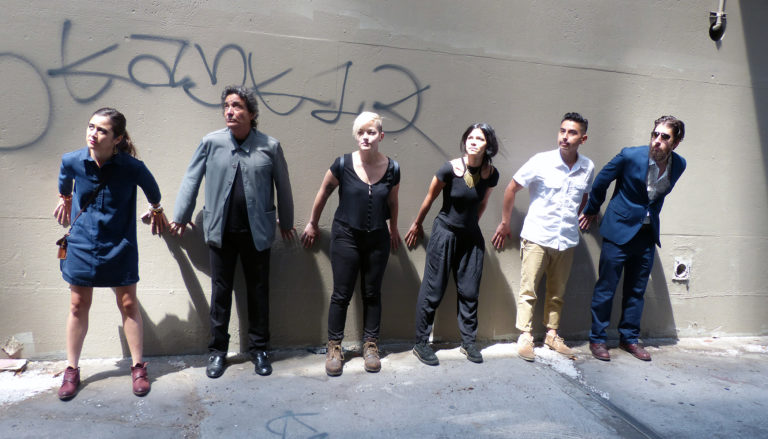This article juxtaposes Marx’s critique of capitalism with recent developments in affect theory. My central argument is that a critique of the tension of capitalist affect is fundamental to a Marxian account of capital: on the one hand, capitalism amplifies the potential affective capacity of bodies through its development and organization of productive forces; on the other, it captures this increase to enrich the bourgeoisie, immiserate the proletariat, and reproduce capitalism. I also sketch the ways that an affective interpretation can provide insight into anti-capitalism resistance and post-capitalist life within Marx’s theoretical and philosophical project. Ultimately, reading Marx’s critique of capitalism for its resonances with Deleuzean-Spinozan affect theory not only generates a newfound apprehension of the affective register of that critique, but also adds to the critical repertoire of affect theory.
Articles
Peer-reviewed articles in cultural studies.
Marxism, Cultural Studies, and the “Principle Of Historical Specification”: On The Form of Historical Time in Conjunctural Analysis
Karl Korsch identifies in Marx’s work what he calls “the principle of historical specification,” the way in which “Marx comprehends all things social in terms of a definite historical epoch.” This work is concerned with this idea and its instantiation in contemporary social theory. With this paper I hope to show how the principle of historical specification has been interpreted within the Birmingham tradition of cultural studies, paying specific attention to (1) the form of historical time implicit in the concept of a “conjuncture,” and (2) the logic of historical periodization that follows from a “conjuncturalist” approach to historical research. I argue that a conception of plural temporality is central to the mode of historical analysis associated with the Center for Contemporary Cultural Studies.
Debord in Watts: Race and Class Antagonisms Under Spectacle
In this paper, I explore Guy Debord’s analysis of race and racializing processes by closely examining the use of footage of the Watts rebellion in Debord’s film The Society of the Spectacle (1973), along with a close reading of Debord’s 1965 text on the uprising, “The Decline and Fall of the Spectacle-Commodity Economy.” Debord’s Marxist perspective on Watts understands the insurgents as potential revolutionary actors, primed for a “second proletarian assault against class society” (SotS, Thesis 47). To complicate Debord’s position, I look at the similarities and differences between his stance and the emergent theoretical paradigm of Afropessimism, which understands anti-black violence not as contingent upon capitalist alienation but instead as gratuitous violence required to uphold the figure of Humanity within civil society.
“Who is this man who is distinct from this citizen?” Revisiting Marx’s Critique of Liberal Rights
Steven Lukes argues that Karl Marx underestimated the importance of human rights. For Lukes, Marx treated human rights only as expressions of the egoism and individualism of bourgeois society and, in doing so, underestimated both the danger of arbitrary political power and the protection afforded by individual rights. My first aim in this essay is to show four substantial problems with Lukes’ reading of “On the Jewish Question,” the text that Lukes finds to contain the “roots” of Marx’s view. My second aim is to argue that—a hundred and fifty years after the publication of Capital—a re-assessment of the marginality of rights in Marx’s thought is overdue. There is nothing in Marx’s thought that should discourage socialists from demanding such rights and this essay finds that this is not a connection between Marxism and socialism that needs severing.
Doing What You Love in the Age of Mass Debt
This paper examines the relationship between student debt and the changing terrain of work in U.S. culture, while attending to how these shifts mark a specifically gendered, racialized phenomenon. Drawing on the AAUW’s 2017 report on student debt, this paper examines the figure of the fashion intern in order to think about how the gender and racial inequities in student debt collude with what Angela McRobbie terms ‘the feminization of work’ to effect a gendered, racialized form of indebtedness. I assert that the ‘do what you love’ ethos described by Miya Tokumitsu contributes to the proliferation of feminized work in the culture industries, such as fashion, and the perpetuation of racial exclusivity within the industry.
Language is a Public Thing
Manifestos have resurfaced as fuel for firing political imaginations and calling people to action in a threatening time. But what can they really accomplish? A rethinking of the limitations of manifestos—their panic-driven contexts, their emphasis on collectivities rather than individuals, the vagueness and combativeness of their language—suggests that there may be other more fruitful ways of instilling care of and for language in everyday life and politics. With due deference to Orwell for his focus on the political dangers of not caring for language, we posit that his prescriptions can also inhibit our abilities to communicate in productive ways, across disparate communities that might stand to gain from breaking out of strictures on political language and expression. Inspired by Arendt’s call to “think what we are doing,” we propose as a starting point a language charter that will make language everyone’s business.
The Politics and Policy of Noise: Motorcycles Making, Masking, and Muddling the Noise of Protest
Noise plays a specific role in the politics of protest. The use of motorcycles to display affiliations, to protest status quo, and to challenge dominant ideologies is powerful, purposeful, and politically messy. In this essay, I trace the use of motorcycles in various modes of protest; I focus on how motorcycles disrupt the social, revealing the indelible charge of sensorial codes of meaning of producing noise—the productive process of drowning out voices, the turning up the volume of dissident perspectives such as how the San Francisco Dykes on Bikes established a sonic audibility in the 1970s to the recent off-duty motorcycle policemen who through using the loudness of their motorcycles protested Death penalty opponents, to the Patriot Guard Riders who mask the bullhorns of the Westboro Baptist Church protests.
Sideways Fences: Resisting Gentrification in Boyle Heights, a Los Angeles Community
From the introduction of hipster IPA beer to fences that go sideways (instead of up and down), Oscar Arguello’s Sideways Fences (2017) explores the gentrification of Boyle Heights, a predominately Latino/a community near downtown Los Angeles. Sol, the main character, is pregnant and lives with her boyfriend Estéban, who drinks too much and spends his discretionary time fixing up a ’52 Chevy. Early in the play, Eva, Sol’s sister, crashes with the couple. The play centers around the trio’s stressed relationship and Sol and Estéban’s upcoming eviction, which is related to the creation of new condos. While at first glance the play appears to embrace common stereotypes including the wayward Latina (Eva) and the alcohol prone Latino, a closer analysis illuminates Arguello’s artistic layering of stereotypes to make legible the conditions/structures that produce the situations in which the trio find themselves.
Persistence in Pedagogy: Teaching Failure, Empathy, and Citation
This self-reflexive essay addresses issues of teaching and pedagogy for social change in the Trump era. It places current teaching reflections in the context of the history of the corporatization of the university, systemic inequities in academia, and current political debates. It expands upon the structure of a teaching philosophy in order to share critical reflection, relevant sources, and pedagogical strategies drawn from the author’s experience teaching in dance departments.
“Truth” in the Age of Trump
Cultural studies scholars have a long history of problematizing the concept of truth. Today, however, many on the left have turned to the tactic of calling out Trump’s lies, enumerating them, fact-checking them, and countering them with contrary evidence. While well-intentioned, dependence on calls for fact-checking and slogans that proclaim allegiance to science without acknowledging the cultural and social factors that affect knowledge production risks reifying some of the problems that early cultural studies scholars rightly highlighted. This essay argues, ultimately, that cultural studies scholars, activists, teachers, and critical theorists should resist the urge to set down the tools of critical theory but instead to apply them with abandon to Trump, his policies, and, perhaps most importantly, to ourselves.
Not About White Workers: The Perils of Popular Ethnographic Narrative in the Time of Trump
This essay rasies three concerns about popular contemporary ethnographies that focus on the rural and white “working class.” First, these ethnographies are not treated as partial accounts of cultural experience but are instead taken as straightforward political and economic analyses. Second, these ethnographies amplify an “empathy mandate,” which demands that our political actions center on trying to understand misunderstood populations—in this case, the so-called “white working class.” Third, by disarticulating the cultural markers of “working classness” from the material conditions of class, these ethnographies obscure the political significance of “working class.” Ethnographies of “white working class” experience may be useful only if we treat them as small openings that lead to bigger and broader stories, rather than as complete and transparent explanations of what is going on.
The Trump Wall: a Cultural Wall and a Cultural War
This essay decodes a Wall-DNA in American culture with an examination of two shaping moments in history, namely the Founding Fathers and the Mexican-American War. It argues that the Trump Wall, instead of protecting, endangers American values and opportunities; instead of uniting the nation, divides it and ignites cultural wars. The Trump Wall portends fear, bigotry, distrust, intolerance and disconnection; it is the Trump War. Therefore, this border construction is more of a mental construct than a physical one, especially when it involves a cultural re-landscaping and boundary shifting between the US and Mexico and within the two nations. The essay also challenges a one-dimensional and static view on American values, and calls for a 21st century sophistication for a culturally nuanced definition of what America means, and a 21st century agility to cross back and forth any walls without sparking a war.
Missives and Other Un-Notes
Beginning his series of disorienting and theatrical vignettes with an extended introduction, Gamboa describes his childhood and young adulthood coming of age in Los Angeles in the 1960s and 70s. It is through these stories of prejudice in elementary school and of mass action against police brutality and the national government’s neglect of communities of color, Gamboa implies, that readers should approach his text. Missives and other Un-notes skewers myths of US national identity, masculinity, and whiteness, placing readers in a dystopic world of violence, surveillance, and the constant threat of annihilation.
#eatthatwall
#eatthatwall is an in-progress performance-installation, presented first at Rhizome DC (a DIY experimental art space in Takoma Park, Washington, DC) on April 23, 2017. The project invited gallery participants to assist in the construction and eating of an edible wall made with approximately 1,200 mini cooked rice bricks set with refried bean mortar. The wall served as an imaginary, fabulist structure to separate a currently un-bordered area between Laredo in Texas and Nuevo Laredo in Tamaulipas, Mexico, or anywhere else this hypothetical border might arbitrarily fit. The performance score following the introduction to the project is a document of the process of making: from initial concepts, to the invitation to build/mimic, to a contemplation of how we digest the events and emotions leading to the wall, and to its eventual end.
Rage Grief Comfort &
Documentation and analysis by Laurie Beth Clark and Michael Peterson of a project by the arts collective Spatula&Barcode: In December 2016 a major city building in Madison, Wisconsin was closed for renovation, and enterprising curators installed a massive temporary art exhibition, titled Municipal. As the community was in the midst of processing the presidential election results, we created Rage Grief Comfort & with the explicit aim of moving participants through and past their immediate emotions.
